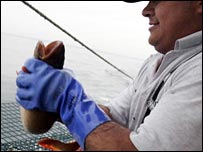Ice cream being made from deep sea fish
6/26/06London, England
A deep sea fish is being used to create ice-cream with less fat and calories. A protein from the blood of the pout fish can lower the temperature at which ice-crystals form, meaning less cream or fat is needed in the final product.
Unilever, the company behind Wall's, Magnum and Carte Dor, has submitted an application to produce the protein using GM technology.
The Food Standards Agency is consulting on whether to allow the technology, which is already approved in the US.
The eel-like pout fish lives at the bottom of the North Atlantic and is able to survive extremely low temperatures, due to a naturally occurring protein in its blood called an ice-structuring protein.
These proteins which can be found in fish, plants and insects protect organisms from tissue damage in very cold conditions by lowering the temperature at which ice crystals grow and by changing the size and shape of the ice crystals.
But rather than extracting the protein from the fish - which Unilever said would be "not sustainable or economically feasible" - the company has developed a way of making the protein in the factory.
The process uses genetically modified yeast to make the protein in large sealed vats.
The genetically modifed yeast is already used in the production of some other foods including cheese.
No genetically modified material would be present in the final product, Unilever stresses in its application to the FSA and the level of the ice-structuring protein in the ice-cream will not account for more than 0.01% of the weight.
Approval
The manufacturing process has already been approved in some other countries including the US where it has been used to make ice-cream which has half the fat and 30% fewer calories than normal.
Low-fat ice-cream could be made using GM technology
An application to use the new technology has been lodged with the Food Standards Agency which is inviting comment.
Unilever said the process had already been approved in the US and other parts of the world.
The FSA said the consultation period was open until 10 July.
"Before any new food product can be introduced on the European market, it must be rigorously assessed for safety.
"In the UK, the assessment of novel foods is carried out by an independent committee of scientists appointed by the Food Standards Agency, the Advisory Committee on Novel Foods and Processes (ACNFP)."
From the BBC

